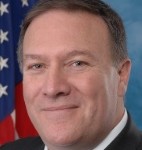Pompeo Downplays Terrorist Threat in Afghanistan to Justify Speedy Withdrawal

Mike Pompeo
Michael Hughes
September 16, 2020
Secretary of State Mike Pompeo during a speech at a virtual think tank event in Washington suggested that the U.S. accomplished its chief objective in Afghanistan because it has decimated al-Qaeda. Pompeo, who certainly has a clear motive for painting a rosy picture, misleads by suggesting al-Qaeda’s strength is reducible to the number of fighters it has inside Afghanistan. Not to mention the fact he mischaracterizes the threat overall by narrowly defining it – because the problem is much bigger than a single jihadi group.
With the entire international community focused on the historic intra-Afghan talks in Doha, Pompeo wants to ensure the narrative is flowing in the right direction. The storyline being sold is that the Trump administration is swiftly withdrawing US troops because it defeated al-Qaeda and brokered the peace deal of the century.
“For the first time now in 20 years Afghans sat down together to begin to pound out what a reconciled, peaceful Afghanistan might look like… it’s a recognition of the reality the things that America has accomplished. There are fewer than 200 al-Qaeda left in Afghanistan today,” Pompeo said at an event hosted by the Atlantic Council on September 15.
The comments come just as President Donald Trump appears more eager than ever to reduce the U.S. military footprint as much as possible in Afghanistan ahead of the November 3 American presidential election. This became even more apparent based on his September 10 decision to nominate William Ruger, a foreign policy analyst and veteran of the Afghan war, to serve as the U.S. ambassador to Kabul.
The Wall Street Journal reported earlier in September that some U.S. officials view the decision to pick Ruger as a sign that Trump wants to ensure troops are removed from Afghanistan quickly. Ruger, in a piece in The National Interest in May, wrote that Trump correctly concluded that a “full and speedy withdrawal” of US troops is imperative.
This isn’t the first time Pompeo has provided an overly-optimistic characterization of the situation in Afghanistan. America’s top diplomat in March told FOX News that al-Qaeda is a “shadow of its former self.” Two American-based security analysts have recently cast doubts on Pompeo’s attempts at narrative-shaping. In fact, they believe an al-Qaeda resurgence is easily foreseeable.
“Al Qaeda has welcomed the February 2020 Doha deal between the U.S. government and the Taliban, describing it as the ‘enemy acknowledging its defeat.’ The U.S. withdrawal from Afghanistan has particular salience in al-Qaeda-aligned propaganda, which portrays it as a watershed in the history of jihad,” CISAC’s Asfandyar Mir and RAND’s Colin Clarke said in a piece for Foreign Affairs on September 9.
Al-Qaeda finds itself in similar shoes as the great American writer Mark Twain once did in the late 19th century. After hearing a rumor that a newspaper had published his obituary, Twain said: “The reports of my death have been greatly exaggerated.”
Let us not forget the UN report from earlier this year that concluded al-Qaeda and the Taliban continue to maintain close relations in violation of the Doha pact. The Taliban refuse to even publicly bad mouth al-Qaeda, never mind breaking ties.
Mir and Clarke warned that the jihadists are looking to exploit the “permissive environment” in Afghanistan if and when the Taliban gain political power. The two accused Pompeo of putting forth a “politically motivated” assessment instead of conducting a sober analysis of the terror group’s trajectory.
“Pompeo’s characterization of al-Qaeda reflects wishful thinking at best and naiveté at worst,” the analysts said of the U.S. top diplomat’s March statement, which could also be applied to his September 15th remarks.
Pompeo’s claim is also disingenuous because he neglects to mention the other jihadi outfits that have flourished in Afghanistan. Regional expert Mansoor Faiz told Xinhua news agency that the number of terrorist groups has exploded to more than 20 since the post-9/11 U.S. occupation.
It also bears mentioning that al-Qaeda’s presence in Afghanistan is more threatening to the surrounding neighborhood. If Washington was smart it would be honest about the threat and pursue multilateral diplomacy with Iran, Russia, Pakistan, China and India, and other states in the region. This needs to be done to contain both al-Qaeda, ISIS and other terror groups that have been expanding throughout South and Central Asia.
Actually, in this situation whether the US approach should be deemed “smart” or not is all about perspective. If it accelerates the troop exit ahead of the U.S. presidential election, the plan looks like a brilliant one in the eyes of Trump and, for that matter, the Taliban.
It is important to stress that the problem is not the fact that Trump wants to remove U.S troops at a swifter pace in order to get re-elected. The point is, Trump does not need Pompeo to propagate myths in order to achieve this objective. The U.S. could have even withdrawn troops without legitimizing the Taliban.
In fact, Washington should consider taking the advice propounded by that classic Los Angeles-based musical group known as Mötley Crüe: “Don’t go away mad – just go away.”
